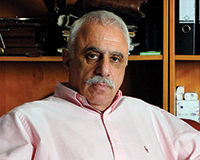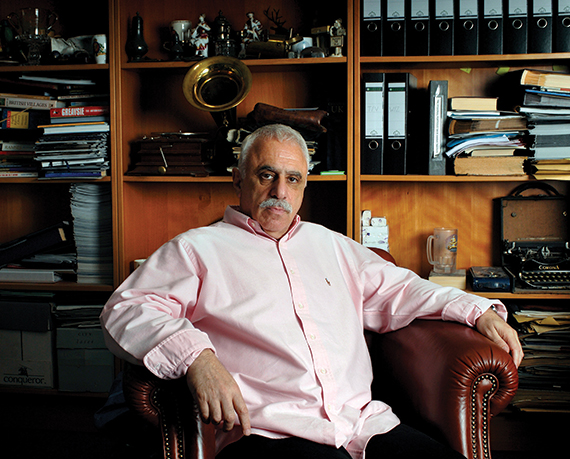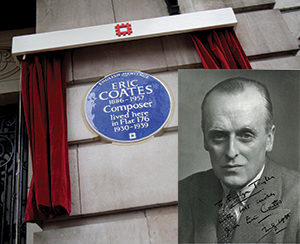Structadene boss David Pearl started his property career with little education and no money. But he now controls a firm valued at £1bn, and can indulge his passion for London’s history with philanthropic giving. Emily Wright reports
“I don’t know how on earth I managed to fail the 11-plus. I mean, for goodness’ sake, no one fails the 11-plus. But I did. And back when I was at school that meant you were on the scrap heap. So that’s where I started.”
It would be fair to say that David Pearl has come a long way. The boss of property group Structadene may not have got off to a flying start in his education, having failed his grammar school entrance exams before eventually leaving school at 15 with no qualifications.
But now? Now he is the chairman of a private company that manages assets currently valued at £1bn (okay, that business may have also gone through a rough time during the recession, but who didn’t?) and is ranked 168th in this year’s Estates Gazette Rich List with an estimated £172m fortune. Proof, if
ever it was required, that sparkling grades are not everything when it comes to making it big.
Neither was any clue of the property market in Pearl’s case. “I got a weekend job when I was 17 at a firm of lettings agents in Forest Gate,” he says. “After doing exactly four mornings in that agency, I decided to set up my own with a friend. We found a lock-up shop on Clarence Road in Hackney, E5, and put some desks in there. We had no money, no connections, we didn’t know anyone and we didn’t know anything. And we sat there. The two of us. We sat there for a while. Because we had no idea what to do next.”
He worked it out soon enough, though. And from gathering letting information on billboards outside newsagents to buying huge projects first in Hackney, then Fitzrovia, W1, Pearl began to build his empire.
“It all felt quite natural after a while. It all fell into place,” says Pearl. “There were many ups and downs, of course. This would happen, that would happen. Then you would get a letter from your solicitor which felt like it might be the end of the world. But you know what? Nothing is the end of the world. I have now had so many letters from solicitors over the years that I learned not to worry. I don’t have sleepless nights anymore. But then money gives you a lot of confidence.”
It is an honest statement from a man for whom money is certainly no longer a worry. And he is dedicated to channelling a fair whack of his fortune towards protecting the city he loves.
A north Londoner since he was a child, Pearl has a great affinity with the capital – and not just because of the deals he has done over the past 50 years.
“I must have mentioned that I employ a part-time teacher and have private lessons once a week to keep up on my London history,” he says. “It’s a great passion of mine.”
So much of a passion that he stepped in to save the blue plaque scheme in early 2013 with an £80,000 personal donation after English Heritage had to suspend the tradition – founded in 1886, but taken over by EH in 1986 – because of budget cuts.
This year Pearl has also lent his support to St Paul’s Cathedral and its £4.1m fundraising effort.
On his philanthropic donations, Pearl speaks matter-of-factly with no hint of self-congratulation.
“Everybody loves a blue plaque,” he shrugs. “It is as simple as that. I don’t think there are many people who walk past them without noticing and reading them. Everybody does and to stop them would have been iniquitous, totally ludicrous, so I decided to save them and I will continue supporting them. Why wouldn’t I support something like that? Something iconic. Something fascinating. Something that helps us learn.”
Pearl on plaques
Blue plaques are permanent historical markers installed in public places in London, around the UK and now throughout the world to commemorate a link between that location and a famous person or event. The world’s first blue plaques were put up in London in the 19th century by the Royal Society of Arts.
When English Heritage was forced last year to suspend the tradition it had taken on in 1986, owing to budget cuts, David Pearl was horrified and vowed to save the little blue signs.
“I read that English Heritage had run out of money and they couldn’t continue the blue plaque scheme,” says Pearl, “so I approached them and said, ‘If I pay the price, will you keep it going?’ I am so glad I did. Just after I had donated the money we were putting up a blue plaque to a guy called Eric Coates where he used to live in Baker Street. He used to write music in the 50s and his claim to fame was that he wrote the music to the film The Dambusters.
“His great nephew came over to see me and told me The Dambusters’ producer went to Eric and asked him to write something for the film, a theme. He told them he had written a piece five years before and nobody wanted it. Did they want to try that for size? The piece of music is so iconic, everyone knows it and he didn’t even write it for the film. He had it in his drawer for five years. I wouldn’t have known that if it hadn’t been for the blue plaque. That story reflects exactly why I stepped in to save the scheme.”
Pearl on St Paul’s
It was on a tour of the cathedral earlier this year that David Pearl fell for St Paul’s. Fast forward to today and he finds himself chairing the 2015-2018 St Paul’s Cathedral Capital Appeal, spearheading efforts to raise £4.1m.
“I fell in love with the place, the building and all the secret nooks and crannies,” he says. “I was so impressed that I started taking one or two friends around on tours. Every time I went I started giving some money and everyone else just wants to get involved too. The building has an effect on people.”
St Paul’s gets no regular funding from the state, English Heritage, or any other official body, despite attracting more than 2m visitors a year. Today what is the most visited place of worship in the UK is in need of major renovations and improvements. Refurbishing the roof, external galleries, and peristyle, the crypt and creating disabled access through the north transept door are the appeal’s priorities.
St Paul’s does charge tourists for admission, though not to attend services. Matthew Lagden, director of development, says: “Our regular commercial income from charging simply doesn’t generate sufficient surplus to cover big multi-year projects.”
For more on the appeal and to get involved, e-mail mlagden@stpaulscathedral.org.uk













